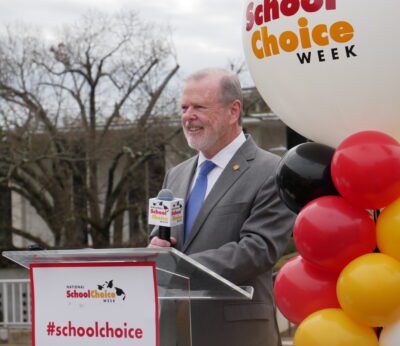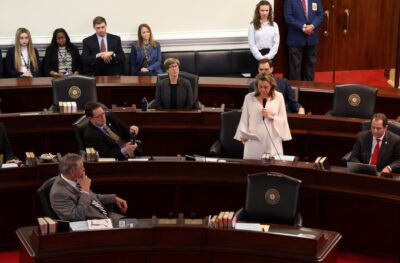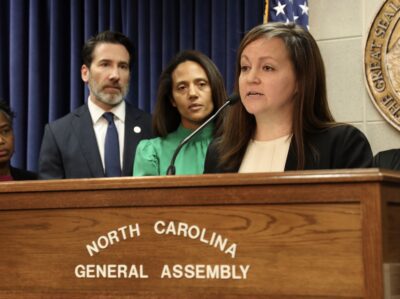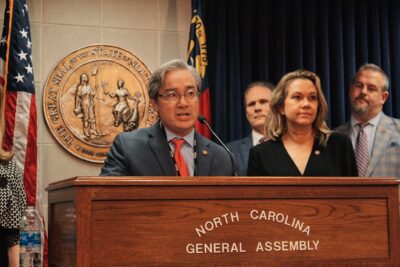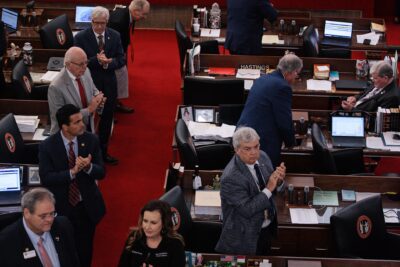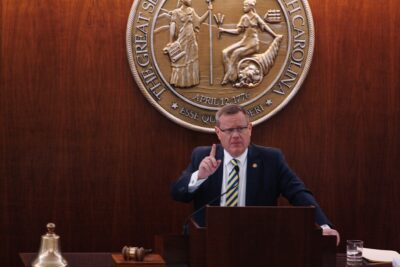
|
|
The 2023 long legislative session in North Carolina included many impactful policies for public schools — among them the vast expansion of public school vouchers, added flexibility for charter schools, and base pay raises for most school employees.
The General Assembly meets for its “long” session beginning in January of each odd-numbered year, when it passes a budget for two fiscal years. On even-numbered years, lawmakers reconvene for the “short session” during the spring.
This year’s short session begins on April 24. During this session, lawmakers can adjust the two-year budget passed in the long session and are able to discuss bills that previously passed one house (known as making crossover) or recommendations from a study commission.
North Carolina has a projected one-time $1.4 billion surplus in state revenues through Fiscal Year (FY) 2025, according to the latest consensus revenue forecast released last week by the Office of State Budget and Management (OBSM) and the General Assembly’s Fiscal Research Division.
This essentially means there is $1.4 billion extra state dollars that lawmakers can choose to invest this short session. There is a Republican supermajority this session, meaning Republicans will drive fiscal and policy decisions.
House Speaker Tim Moore, R-Cleveland, recently told media that he would like to fund more money for the Opportunity Scholarship program. The program, which funds private school vouchers at eligible schools, was expanded during the long session to all families regardless of income.
Moore also said he would like to see funding for child care subsidies, additional raises to school and state employees, and an additional $400 million toward Medicaid.
The Department of Public Instruction (DPI) said in the fall that all of DPI’s major policy requests became law during the 2023 long session. This session, DPI’s legislative request includes an overhaul to school performance grades, and investment in supports for math, literacy, and low-performing schools.
In the subheadings below, you can find a brief recap of the major K-12 policy items from the 2023 long session, plus a look at what to expect this short session. Here’s a link to the summaries for education-related laws passed in the long session.
You can also see all of the education bills that made crossover here. You can see all the bills eligible to be discussed during the short session on the General Assembly’s website.
Finally, you can also see the members of the General Assembly’s education committees below:
- House K-12 Education Committee, chaired by Reps. Hugh Blackwell, R-Burke; Tricia Cotham, R-Mecklenburg; and John Torbett, R-Gaston.
- House Appropriations Committee on Education, chaired by Reps. David Willis, R-Union; Torbett, and Cotham. Cotham was announced as chair of the committee on April 19 by Moore.
- Senate Education/Higher Education Committee, chaired by Sens. Amy Galey, R-Alamance, and Michael Lee, R-New Hanover.
- Senate Appropriations Committee on Education/Higher Education, chaired by Sens. Galey; Lisa Barnes, R-Frankin; and Dean Proctor, R-Caldwell.

Opportunity Scholarship expansion
The 2023 budget provided for universal private school vouchers through the Opportunity Scholarship Program by removing all income eligibility requirements for recipients starting with the 2024-25 school year. The budget added $250 million to the Opportunity Scholarship Grant Reserve over the biennium, putting the revised appropriation for the reserve at $618 million through FY 2025.
The budget also eliminated the requirement that a student needs to have previously attended a public school.
Including the additional funds over the biennium included in the money report, the budget allocated a total of $4.4 billion to the Opportunity Scholarship Grant Fund Reserve over the next decade. The budget increased the allocations to the reserve over the next 10 years by more than $1.9 billion.
After the Senate first proposed the program’s expansion, Democratic Gov. Roy Cooper declared a state of emergency for public education in North Carolina. In the months since, a bipartisan group of education stakeholders have also expressed concerns about the expansion.
Primary concerns include the lack of testing accountability at private schools, the impact of the expansion on funding and enrollment at public schools, and that private schools don’t have to serve all students.
About 72,000 applications were received ahead of the deadline on March 1, and of that, the families of 13,511 students were notified by the the N.C. State Education Assistance Authority (NCSEAA) that they received a scholarship for the 2024-25 school year. The 13,000-plus students are “new” students, which means they do not currently receive an Opportunity Scholarship.
The families notified so far that they would receive a scholarship were all Tier 1 families, meaning they came from the lowest income levels. Those students can receive up to the maximum scholarship amount of $7,468, based on the tuition and fees charged by the private school they will attend.
In early May, NCSEAA will extend offers to some Tier 2 families, depending on how many Tier 1 families accept or decline their offers (which were due by April 19).
“There are not sufficient funds available to offer students in Tiers 3 and 4 an award,” said the press release. “If additional funds become available, NCSEAA will notify families as soon as possible.”
Rep. Moore recently told reporters that Republicans are discussing funding an additional $300 million toward Opportunity Scholarships to offer vouchers to all applicants.
It is not clear how many of the remaining applicants are already private school students.
NCSEAA told EdNC in February that they will provide DPI with information on Opportunity Scholarship students by Oct. 15, as required by budget statute.
“DPI will be responsible for a report to the General Assembly on students who were enrolled in public school prior to receiving an Opportunity Scholarship,” NCSEAA Director of Governmental and External Affairs Mary Shuping said.
This likely means that school districts will not learn how their enrollment will change due to private school enrollment until school starts in August.
According to the summary text of the law, “DPI must report no later than April 1 of each year to the Joint Legislative Education Oversight Committee on the cumulative difference in the current school year between the Opportunity Scholarship grant award amount for each prior public school attendee enrolled in a nonpublic school and the average State per pupil allocation for daily membership for a student in a public school unit.”
The budget did not include stabilization funds for public schools impacted by shifts in enrollment due to increased private school enrollment. However, starting in the 2025-26 school year, the budget says “it is the intent of the General Assembly to reinvest in the public schools any savings realized by the State each year” when a student accepts a scholarship “that is less than 100% of the average State per pupil allocation for average daily membership for a student in a public school unit.”
It is not clear how much this will practically result in for school districts.
As of April 9, 2024, 32,541 students had Opportunity Scholarships in North Carolina. You can hover on the counties in this map to see how many recipients each county currently has.
Teacher pay
The 2023 budget gave larger raises to beginning teachers, with raises decreasing with years of experience. Those base salary raises ranged from 3.6% to 10.8% over the 2023-25 biennium.
The budget said teachers will also get step increases and could qualify for advanced teaching roles and supplements. Importantly, teacher supplements vary widely by district.
Most other school employees were set to receive a 7% raise over the next two years (through FY 2025).
As mentioned above, Moore has indicated wanting to give further raises to school and state employees with the surplus funds.
The final report from the House Select Committee on Education Reform also suggests teacher pay raises will be discussed during the short session. Specifically, the report recommended lawmakers continue to support the Advanced Teaching Roles (ATR) program.
“The Committee recommends that the General Assembly continue to support North Carolina teachers and further assess compensation for teachers, as well as find ways to attract and retrain teachers in hard-to-staff positions,” the report says.
Rep. Torbett, who co-chaired the education reform committee, said, “It is and always should be job #1 to try and get our compensation for teachers at a more professional level.”
Rep. Maria Cervania, D-Wake, said, “I think we are all in agreement that we want to see teachers’ compensation be very much clarified because we’re losing workforce so significantly.”
The 2023 budget did not include the reinstatement of master’s pay, which the House and governor included in their budget proposals.
The budget did provide a one-time cost-of-living supplement to retirees of 4% in 2023-34.
Notably, the budget did not include anything regarding the State Board of Education’s March 2023 request to run a six-year pilot of its plan to reform licensure and teacher pay in North Carolina. Because the plan was not discussed during the long session, it is unlikely to be revived during the short session.
You can read more about the specific pay schedules and supplements outlined for teachers, including local supplements and supplements for advanced teacher roles, in this EdNC article from September.
Principal pay and licensure
The budget also included a new salary schedule for principals.


The budget outlined bonuses for principals based on statewide growth, on page 154, noting that principals can only receive one bonus, paid at the highest amount for which the principal qualifies.
Session Law 2023-125 directs DPI to create a portfolio-based assessment for principal licensure. This change was recommended by DPI. The statute says the State Board of Education must approve such an assessment by June 15, 2024.
That law also directs the Board to adopt rules for two classes of administrator license — an administrator license and a provisional assistant principal license. Additionally, the Board must develop rules for determining whether individuals who completed an out-of-state administrator preparation program meet North Carolina requirements.
In March, two of North Carolina’s 2023 Regional Principals of the Year asked lawmakers during a House education reform meeting to further revise the state’s plan for paying school principals. Among other things, two representatives from the North Carolina Principals and Assistant Principals Association (NCPAPA) said the current plan is too tied to test scores. This discourages some principals from serving in low-performing or high-poverty schools, they said.
NCPAPA’s proposed plan would add a retention bonus and include factors such as how many multi-language and students experiencing homelessness a school has, in addition to school size and performance.
Committee Co-Chair Torbett said the fiscal department would work to provide a “rough estimate” on how much the principals’ proposal would cost to implement.
The committee’s final report says, “The Committee acknowledges that there are additional factors that could be included in a new principal pay plan that considers the complexity of a school and the longevity of a principal when determining salary. The committee recommends that the General Assembly continue working to ensure that all schools have effective principals and study the impact that a new salary schedule may have on principal recruitment and retention.”
School performance grades
In February, State Superintendent Catherine Truitt presented DPI’s proposal for school performance grade redesign to lawmakers. To move forward, the model requires legislative action.
Currently, school grades are based on each school’s achievement score, weighted 80%, and on students’ academic growth, weighted 20%. Education leaders say that formula does not capture the full picture of the work happening in the state’s public schools.
DPI’s presentation said national data “affirms North Carolina schools are performing considerably better than their state performance grades otherwise suggest.”
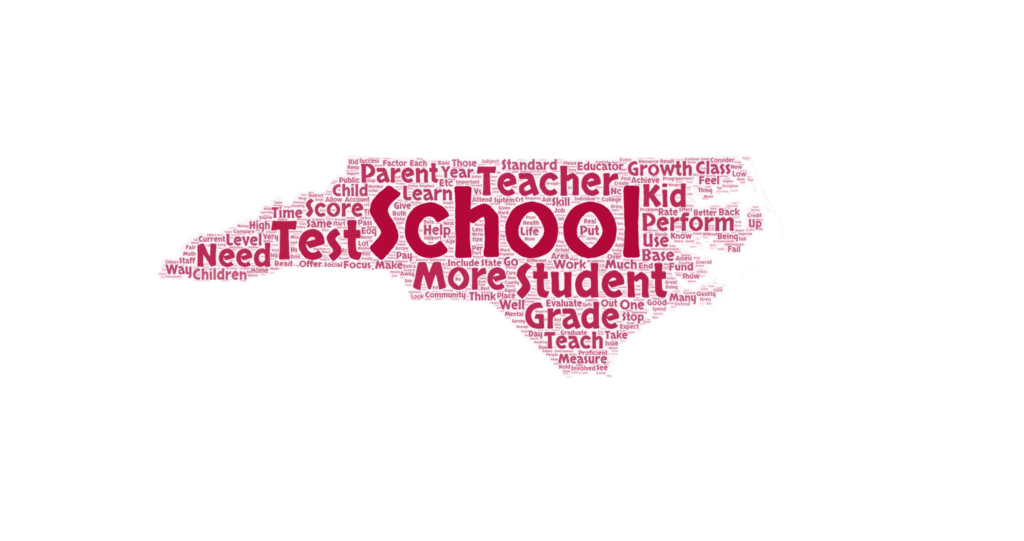
Under DPI’s proposed model, schools would receive four different grades. Those four grades, listed below, would not be combined into one single letter.
- Academics. Across all grades, this would measure proficiency in math, science, and reading.
- Progress. This grade would measure a school’s growth, based on EVAAS data.
- Readiness. Across K-12, this grade would measure postsecondary preparation. In middle school, it would also include career development plans. In high school, it would also include postsecondary outcomes and graduation rates.
- Opportunity. This grade would measure chronic absenteeism, school climate, and intra/extra curricular activities.
“Instead of one performance grade, we have four,” Truitt told lawmakers. “This proposal creates a more robust state accountability model. That is the best way for holding schools accountable for providing a high-quality education.”
On March 5, Truitt lost the Republican primary for the 2024 state superintendent race.
But the education reform committee’s final report, published March 25, still recommends approving DPI’s recommended model — though the report recommends creating one summative grade, rather than four.
Charter schools
The 2023 long session also expanded choice through charters schools, which are public schools with more flexibility.
The General Assembly established charter schools in North Carolina in 1996. This academic year, there are 211 charter schools in the state. DPI currently expects three charter schools to open in the fall, down from 12 that were originally approved.
State law previously gave the State Board of Education sole authority of charter school oversight in the state, including the approval and renewal of charters. The Charter Schools Advisory Board assisted the Board by providing recommendations. That advisory board was assisted by the Office of Charter Schools.
After a law enacted in August, the former Charter School Advisory Board no longer exists. Instead, a newly established Charter School Review Board has authority to approve charter applications, renewals, and material changes. Under the law, the State Board of Education can only appeal the review board’s decisions.
“This action will make the application process more efficient, more cost-effective, and much more streamlined for all stakeholders involved,” said Rep. Tricia Cotham, R-Mecklenburg, a primary sponsor of the bill.
After the State Board of Education enacted a policy in September to exercise its constitutional responsibility of financial accountability over charter schools, the 2023 budget limited that discretion. Now, the Board can only withhold funds to charter schools in three specific circumstances, listed below.
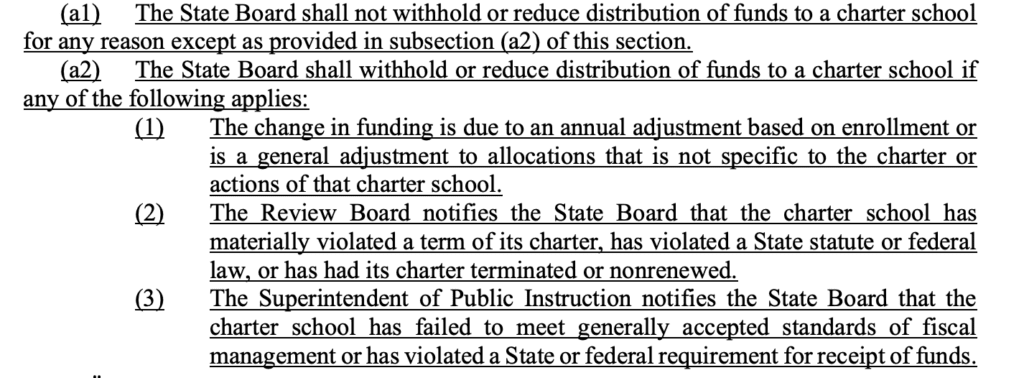
The second section of Session Law 2023-107, Charter School Omnibus: Limit Enrollment Caps to Low-Performing Schools, allows charter schools that are not low-performing to set their enrollment each year. Previously, this cap had to be approved by the State Board of Education if it exceeded a 30% growth rate.
Under the new law, low-performing charter schools can now ask the state Board to grow more than 20%.
The 2023 budget also laid out a process for charter schools to offer remote academies, which you can view here.
The law also provided a one-year extension of the state’s two virtual charter schools, and allowed them to increase their enrollment. The schools were launched during the 2015-16 school year as a pilot program. Since then, they have consistently been designated as low-performing schools.
“Pilot schools are eligible to apply for charter renewal as a remote charter academy at the conclusion of the pilot,” the law’s summary text says.
The education reform committee’s final report did not make any specific recommendations regarding charter schools or funding.
Graduation requirements and curriculum
The budget required the State Board of Education to create a three-year graduation track for high school students by Nov. 1, set to go into effect during the 2024-25 school year. That track consists of 22 credits and requires parental consent.
The budget stated that “local boards of education shall offer a sequence of courses in accordance” with that minimum requirement. Many schools already allow early graduation pathways for some students, but most schools typically require 28 credits for graduation.
Many education leaders worried the budget’s provision will prevent them from requiring more than 22 credits for any students. Last October, DPI staff said it was working with the General Assembly on technical corrections that would allow school districts to require more than 22 credits for most students.
In the meantime, the Board adopted an emergency rule last fall regarding a three year-graduation track. Under the new policy, the Board no longer grants “clear and specific authority to local boards of education” to exceed the 22 credits required.
Local boards “may provide recommendations for additional requirements,” the emergency rule says.
Students who opt for the three-year graduation track can receive a two-semester scholarship at eligible postsecondary institutions. The scholarship must be distributed in the two academic years immediately after graduation from high school.
The scholarship amount will be determined annually using the NCSEAA’s formula for determining student need based on family income.
“No scholarship can exceed the cost of attendance at the eligible postsecondary institution where the student is enrolled,” the law’s summary text says.
You can read more about the early graduation track and requirements here.
According to the budget, local school districts must begin advising students of the early graduation track and process during the 2023-24 school year.
It is unclear how this policy will impact public school enrollment, particularly with all the other policies enacted during the long session. Early graduation could also have ripple effects on community colleges and dual enrollment.
“This is just another step toward recognizing that the nature of school and work is changing before our very eyes,” Truitt said in October. “I think it is a very small percentage of students for who it is right to stop at 22 (credits) — this may continue to grow as more and more options become available to students — but what I really like is that this policy requires parent buy-in for this happen.”

Career development and computer science
The budget directed the State Board of Education to develop standards for a new career pathways course in middle school. That course will help meet another new requirement, which requires seventh graders to develop career development plans in order to move to the next grade level. In 10th grade, students must revise that plan to move to the next grade.
The Board had to pick at least 20 local school administrative units to pilot the career development plan requirements during the 2023-24 year. Then, the budget said, the state will implement the full plan in 2024-25.
Charter schools are not required, but are encouraged, to make such plans. You can read more about the required plans on page 87 of the bill text.
The budget also included several career-related grants meant to expose students to K-12 and STEM career fields.
Under Session Law 2023-132, the State Board of Education must also require “a passing grade in a computer science course” for graduation, starting with ninth graders in the 2026-27 school year. School districts can participate starting with the 2024-25 school year.
Students enrolling in a North Carolina public high school after completion of 11th grade will be exempt from the requirement, per the law, along with “any student whose individualized education program states that the student’s disability would prevent the student from completing that graduation requirement.”
The initiative was championed by DPI and Truitt during the long session.
Under the law, computer science will be added to the English, math, arts, science, and social studies requirements for high school graduation in North Carolina. In order to add the requirement, the number of electives required will be reduced by one.
Truitt said last November that DPI is being intentional about how to help small districts in particular implement these requirements well.
‘Parents’ Bill of Rights’ and DEI
Session Law 2023-106, known as the “Parents’ Bill of Rights,” became law on Aug. 16, after the General Assembly overrode Gov. Roy Cooper’s veto of the bill.
The law bans curriculum on gender identity, sexual activity, or sexuality in kindergarten through fourth grade. It also requires schools to notify a parent about their child’s physical and mental health, including any school health care services they use, changes to their well-being, or requests to change a student’s pronouns.
The law also allows parents to review all curriculum and establishes remedies and timelines for parental concerns. Under that provision, the law mandates that school governing bodies adopt procedures for parents to notify principals regarding concerns about curriculum. A process to resolve concerns should take place within seven days of the date of notification by the parent.
After 30 days, “the public school unit shall provide a statement of the reasons for not resolving the concern.” At that point, parents can also request a “parental concerning hearing” with the State Board of Education.
Last November, the Board approved a new policy regarding such hearings. Under the policy, parents can only request a hearing with the Board under limited circumstances. Book challenges cannot be considered at those hearings, and must be handled at the local level.
Read more about the Board’s policy here. You can also read the General Assembly’s summary of the wide-encompassing law here.
Last week, the UNC Board of Governor’s Committee on University Governance voted unanimously and without discussion to repeal and replace the UNC System’s current diversity, equity, and inclusion (DEI) policy.
The committee’s proposed policy, among other things, would eliminate system-wide DEI metrics and goals across the UNC System, along with the requirement for schools to appoint a senior-level DEI officer.
The policy will go before the full Board of Governors on its consent agenda in May. It is effective upon its adoption, the draft document says.
The likely decision could have ripple effects on other institutions of education, from K-12 to community colleges. Other states, like Florida, have passed statewide anti-DEI laws.
Already, during the long session, Republicans proposed similar legislation. House Bill 187, Equality in Education, is an act “to demonstrate the General Assembly’s intent that students, teachers, administrators, and other school employees recognize the equality and rights of all persons and to prohibit public school units from promoting certain concepts that are contrary to that intent.”
The bill made crossover, so is eligible to be discussed during the short session.
What else is on the table?
The House education reform committee recommended in its report that the General Assembly “identify various funding streams for refreshing the devices currently in schools.”
Nearly 80% of North Carolina districts have reported they do not currently have sufficient resources “to sustain their refresh cycles for student devices beyond ESSER funding,” DPI told lawmakers in February.
That report also recommended, with regards to school counselors, that the General Assembly “study the impact that funding at the recommended student to professional ratios may have on student outcomes.”
The American School Counselor Association (ASCA) recommends a ratio of 250 students: 1 counselor. In 2022-23, there were 4,497 counselors in North Carolina for a ratio of 343:1.
That report also recommends the General Assembly support DPI’s continued “learning loss” recovery “by investing in the following:
(i) building on early grade literacy and math progress,
(ii) providing targeted and evidence-based reading and math interventions in middle grades,
(iii) exploring STEM initiatives aligned to workforce priorities, and
(iv) renewing a commitment to the Department’s research in studying and identifying effective interventions.”
Finally, the report recommends legislative support for DPI’s efforts to prepare all students for Math 1.
There are several bills that did not become law last session that are eligible to be taken up during the short session:
- HB 756, Standards Advisory Commission, would create the Standard Course of Study Advisory Commission (SCOS) “to recommend academic standards to the State Board of Education for approval.” Currently, the Board considers recommendations from DPI. Under this bill, the SCOS Commission would largely consist of appointees by the General Assembly.
- HB 188, Standards of Student Conduct, would remove a list of student conduct that “would not be deemed to be a serious violation” from state statute. Such conduct includes things like inappropriate or disrespectful language not following a “staff directive,” violating dress code, and minor fights that don’t involve weapons or injuries. The current policy is meant to minimize the time students spend out of school due to long-term suspension or expulsion by limiting such penalties to “serious violations.” Some educators worry a bill like HB188 would lead to more students missing school.
- HB 382, Registered Nurses in Schools, would allow licensed registered nurses to be employed as school nurses. DPI asked last session for there to be a school nurse in every school, but this is not specifically addressed in the bill.
- HB 136, Arts High School Diploma Endorsement, would require the State Board of Education to create an arts proficiency high school diploma endorsement.
- Finally, the budget included funding to permanently eliminate the reduced-price lunch copay for North Carolina students, and eliminate penalties for unpaid student meal debt. While none of the bills proposing universal free meals for students made crossover, the short session could include additional policies or appropriations related to expanding meal access for students.



